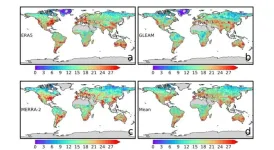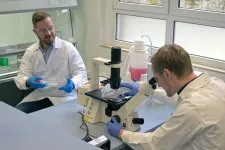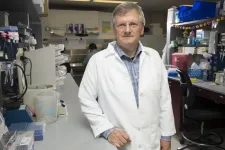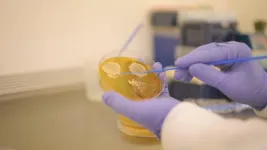(Press-News.org) UC Davis MIND Institute Director Leonard Abbeduto is calling for a major shift in the way research into autism and other neurodevelopmental disabilities is conducted. He co-authored a paper titled “Toward Equity in Research on Intellectual and Developmental Disabilities” that was the basis for a special issue of the American Journal on Intellectual and Developmental Disabilities. The issue was published today.
Abbeduto, a distinguished professor in the Department of Psychiatry and Behavioral Sciences, argues that researchers should move away from placing people into categories based solely on diagnosis. Instead, he writes, they should consider the many identities of people with disabilities, including background, support needed and more. He and lead author Sara Kover, an associate professor at the University of Washington, also state the need for more attention to issues of equity.
“Our goal in writing this piece was to encourage more dialogue about the impact of long-standing biases, such as ableism and racism,” Kover explained. “It is our responsibility as a field to challenge our thinking, question assumptions, and take steps toward equitable practices — even and especially if those actions are uncomfortable.”
The special issue also includes a commentary from the National Institutes of Health, four commentaries from individuals with diverse viewpoints and a response from Abbeduto and Kover.
“The accompanying commentaries are so powerful. We knew our writing would be an imperfect offering, and each commentary identifies gaps and raises important ideas,” Kover said.
In this Q&A, Abbeduto shares why he and Kover are calling for this new approach, what alternatives exist, and why he’s hopeful that progress is being made toward increased equity in research and care.
What was your main goal in putting this special issue together?
We’re questioning the value of the current approach to all our clinical decisions and research paradigms. Everything is based on diagnostic categories: intellectual disability, autism, fragile X syndrome and more. Relying on these categories hides the fact that things can vary from person to person. It also identifies the person in terms of their “label,” rather than recognizing that their life experiences and outcomes may be determined by many other factors. One example we cite is that in the U.S., race may be a more important determinant of the course of many people’s lives than whether they meet the diagnostic criteria for a condition.
Identifying people by these categories continues to place the onus on the individual. It’s ‘you have autism, so you need assistance’ in a sort of paternalistic way. Our hope is that we can acknowledge that we all need levels of support. If we can cater the support more to individual differences along multiple dimensions, that would be more effective and equitable.
What are some of the challenges to changing this reliance on categories?
Everything is built around these categories. If you don’t get the diagnosis, you can’t get interventions. This has created systemic barriers that lead to bias, discrimination and inequities. The way we measure interventions is also created according to the dominant culture, leaving out people from underrepresented groups. They’re less likely to take part in research, be adequately assessed or get needed support.
We first proposed a similar shift back in 2014, but people argued that children wouldn’t get treatment without the categories. But the truth is, if you have a system that isn’t equitable, it doesn’t make sense to keep reinforcing it.
What alternative research approaches do you recommend?
I’m interested in a more dimensional approach, based perhaps on what support people need. For example, we could ask whether someone could benefit from specialized help with reading, independent of whether they have an intellectual disability or fall into the category of autism or fragile X syndrome.
Other approaches include the neurodiversity perspective, which asserts that differences are not deficits and those that focus more on social factors such as income level, race and ethnicity.
What changes have you made in your own research in line with this new approach?
The MIND Institute is building a network of partnerships with self-advocates, families and community organizations to improve equity in research, which has been eye-opening. We are meeting with people who communicate in different ways and have very different abilities, and it’s been so valuable to learn how to create a space that everyone can participate in. This has already informed our research agenda and created partnerships that I hope will endure.
Personally, my research has moved away from comparing people with fragile X syndrome to people in some other category. I’m focused on understanding what are the experiences, skills and family factors that allow people with fragile X syndrome to be either more or less independent as they transition to adulthood. We’re getting away from the tendency to always compare and look for weaknesses and instead working to understand people’s lives so we can provide different levels of support as a society.
What other changes are needed in this field of research to achieve this goal?
We need to continue to diversify our workforce of clinicians and researchers. We need people who have lived experiences around equity. The systemic barriers in society are reflected in our institutions of research, health systems and more in the U.S., and the lack of trust that marginalized groups have in terms of academic research is a big challenge, too. And it all goes back to the fact that you need a diagnosis to get services. At some point, if you don’t question the system and try to change it, you’re going to keep contributing to the problem.
Putting together this special issue was very energizing, and the commentaries that accompanied our article makes me quite optimistic. People have been thinking about these issues for a long time. There won’t be one right answer for how to change things.
END
MIND Institute director calls for new approach to equity in autism, fragile X research
Commentary in special issue of American Journal on Intellectual and Developmental Disabilities advocates for focus on individual, not diagnosis
2023-08-29
ELSE PRESS RELEASES FROM THIS DATE:
Rapid shifts from drought to downpour occurring more often
2023-08-29
New research shows that wild swings from severe drought to heavy rains are becoming more common with climate change in many parts of the world and that feedback loops from the land itself are likely contributing to the trend.
The research looked at four decades of meteorological and hydrological data on a global level and found seven regional hotspots around the world where the trend was getting worse: eastern North America, Europe, East Asia, Southeast Asia, southern Australia, southern Africa, and southern South America.
“We are especially concerned with the sudden shift from drought to flood,” said coauthor Zong-Liang Yang, a professor at The University of Texas at Austin Jackson ...
Hemp helps to heal
2023-08-29
A few days ago, the federal government took the controversial decision to make the acquisition and possession of small amounts of cannabis exempt from punishment. Provided the German parliament approves the draft bill, the “Cannabis Act” will come into force next year. While some consider this move to be long overdue, others continue to warn strongly against the health risks of cannabis use.
The Jena researchers and their colleagues are now taking a different look at cannabis – at the traditional medicinal ...
Department of Energy announces $24 million for research on quantum networks
2023-08-29
WASHINGTON, D.C. - Today, the U.S. Department of Energy (DOE) announced $24 million in funding for three collaborative projects in quantum network research.
Scientific research infrastructure linked with quantum networks is needed to realize distributed quantum computers. These quantum computers could simulate complex scientific processes inaccessible to computational platforms of today, integrate quantum sensors that promise measurements of unprecedented precision, and address previously inaccessible scientific questions of importance.
“Advances in quantum networking are enabling effective interconnections ...
A new fly model developed to find treatments for UBA5 deficiency, a rare epileptic brain disorder
2023-08-29
Developmental and epileptic encephalopathy (DEE) refers to a group of neurodevelopmental conditions characterized by developmental delay, cognitive impairment, and seizures in children. In 2016, the first case linking variants in both the copies of UBA5 gene to DEE44 was reported. Since then, twelve distinct missense variants in the UBA5 gene have been identified in 25 patients. A recent study by Dr. Hugo J. Bellen and his team at the Jan and Dan Duncan Neurological Research Institute (Duncan NRI) at Texas Children’s Hospital and Baylor College of ...
Statewide project to provide care and support to people living with dementia and their care partners
2023-08-29
INDIANAPOLIS—An Indiana University School of Medicine statewide project in collaboration with Indiana University Health was recently funded to support people living with dementia as well as their family care partners find more support and resources, thanks to a new $686,000 grant from the National Institute on Aging IMPACT Collaboratory.
The Aging Brain Care Virtual program will be the first study to test dementia collaborative care in Indiana University Health primary care. The project will utilize the ...
Magnitude of placebo response identified in drug for treatment of hot flashes
2023-08-29
WACO, Texas (Aug. 29, 2023) – Hot flashes are one of the most concerning and most reported symptoms among menopausal women and breast cancer survivors. Currently, paroxetine is a FDA-approved non-hormonal drug used for the treatment of hot flashes. In an article published this month in the journal Frontiers in Psychiatry, researchers at Baylor University tested the efficacy of paroxetine by conducting a systematic review and meta-analysis of six clinical trials, finding that the benefits of paroxetine in the treatment of hot flashes to be comparable to that of the placebo response.
The study included information ...
Presenting non-traditional symptoms, women suffer worse heart disease outcomes than men
2023-08-29
Media Contacts:
Emily Gowdey-Backus, director of media relations
Nancy Cicco, assistant director of media relations
More than a dozen medical studies from around the globe show women suffer worse outcomes when diagnosed with and treated for cardiac issues – the No. 1 killer in the world according to the Centers for Disease Control.
The discrepancy, as summarized by UMass Lowell biomedical and nutritional sciences Associate Professor Mahdi O. Garelnabi of the Zuckerberg College of Health Sciences and colleagues from the University of Maryland School of Medicine, Lebanese American ...
Researchers prep fentanyl, heroin vaccines for human trials
2023-08-29
MISSOULA – Researchers at the University of Montana and their partners are nearing human trials for vaccines to prevent fentanyl and heroin drug overdoses.
The vaccines would protect people struggling with drug addiction or those at risk of accidental overdose. According to the National Institutes of Health, more than 106,000 U.S. drug overdose deaths were reported in 2021. Of those, 71,000 can be attributed to synthetic opioids like fentanyl.
Researcher Jay Evans directs the UM Center for Translational Medicine, which is ...
Yeast studies show that diet in early life matters for lifelong health
2023-08-29
Researchers at the Babraham Institute are proposing an alternative link between diet and ageing based on studies in yeast. Dr Jon Houseley and his team have published their experiments, showing that healthy ageing is achievable through dietary change without restriction by potentially optimising diet, and that ill-health is not an inevitable part of the ageing process.
Scientists have long known that caloric restriction - intentionally consuming far less calories than normal without becoming malnourished - improves health in later life and may even extend life. However, studies in mice show that caloric restriction really needs to be maintained ...
Want to fight climate change? Don’t poach gorillas (or elephants, hornbills, toucans, etc.)
2023-08-29
Here’s a climate solution we can all get behind: don’t kill elephants. Or poach gorillas – or wipe out tapirs, hornbills, or other large-bodied wildlife that eat fruit and disperse large seeds. That’s because a new paper by the Wildlife Conservation Society (WCS) found that overhunting of these species makes forests less able to store or sequester carbon. The authors describe their results in the journal PLOS Biology.
The authors found that many of the mammals and birds targeted by illegal and commercial hunting are fruit eaters that disperse large seeds from tree ...
LAST 30 PRESS RELEASES:
Alkali cation effects in electrochemical carbon dioxide reduction
Test platforms for charging wireless cars now fit on a bench
$3 million NIH grant funds national study of Medicare Advantage’s benefit expansion into social supports
Amplified Sciences achieves CAP accreditation for cutting-edge diagnostic lab
Fred Hutch announces 12 recipients of the annual Harold M. Weintraub Graduate Student Award
Native forest litter helps rebuild soil life in post-mining landscapes
Mountain soils in arid regions may emit more greenhouse gas as climate shifts, new study finds
Pairing biochar with other soil amendments could unlock stronger gains in soil health
Why do we get a skip in our step when we’re happy? Thank dopamine
UC Irvine scientists uncover cellular mechanism behind muscle repair
Platform to map living brain noninvasively takes next big step
Stress-testing the Cascadia Subduction Zone reveals variability that could impact how earthquakes spread
We may be underestimating the true carbon cost of northern wildfires
Blood test predicts which bladder cancer patients may safely skip surgery
Kennesaw State's Vijay Anand honored as National Academy of Inventors Senior Member
Recovery from whaling reveals the role of age in Humpback reproduction
Can the canny tick help prevent disease like MS and cancer?
Newcomer children show lower rates of emergency department use for non‑urgent conditions, study finds
Cognitive and neuropsychiatric function in former American football players
From trash to climate tech: rubber gloves find new life as carbon capturers materials
A step towards needed treatments for hantaviruses in new molecular map
Boys are more motivated, while girls are more compassionate?
Study identifies opposing roles for IL6 and IL6R in long-term mortality
AI accurately spots medical disorder from privacy-conscious hand images
Transient Pauli blocking for broadband ultrafast optical switching
Political polarization can spur CO2 emissions, stymie climate action
Researchers develop new strategy for improving inverted perovskite solar cells
Yes! The role of YAP and CTGF as potential therapeutic targets for preventing severe liver disease
Pancreatic cancer may begin hiding from the immune system earlier than we thought
Robotic wing inspired by nature delivers leap in underwater stability
[Press-News.org] MIND Institute director calls for new approach to equity in autism, fragile X researchCommentary in special issue of American Journal on Intellectual and Developmental Disabilities advocates for focus on individual, not diagnosis







